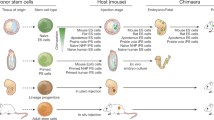
Overview
- Includes cutting-edge methods and protocols
- Provides step-by-step detail essential for reproducible results
- Contains key notes and implementation advice from the experts
Part of the book series: Methods in Molecular Biology (MIMB, volume 2005)
Access this book
Tax calculation will be finalised at checkout
Other ways to access
About this book
This volume addresses challenging new questions surrounding stem cell-based chimera research. This book is organized into three parts: Part One provides readers with a summary of different human donor cell types. The chapters in this section discuss ways to evaluate new types of pluripotent stem cells; the derivation of naïve and primed pluripotent stem cells from mouse preimplantation embryos; and the ethical and regulatory complexities of informed consent for the procurement of somatic cells. Part Two discusses methods for generating chimeras. The chapters here look at chick models and human-chick organizer grafts; generating human-pig interspecies chimeras; and techniques for transplanting mouse neural stem cells into a mouse disease model for stroke. Part Three concludes the book with a look at ongoing ethical controversies and new scientific directions. Chapters in this part cover the ethics of crossing the xenobarrier; animal welfare; experimentation with spermatogonial stem cells; and cautious approaches to human-monkey chimera studies to further understand complex human brain disorders. Written in the highly successful Methods in Molecular Biology series format, chapters include introductions to their respective topics, lists of the necessary materials and reagents, step-by-step, readily reproducible laboratory protocols, and tips on troubleshooting and avoiding known pitfalls.
Cutting-edge and thorough, Chimera Research: Methods and Protocols is a valuable resource for scientists interesting in using chimeras as a research tool while also taking into consideration their complex ethical scopes.
Similar content being viewed by others
Keywords
Table of contents (15 protocols)
-
Front Matter
-
Human Donor Cell Types: Potency and Position
-
Front Matter
-
-
Non-Human Hosts: Species and Developmental Stages
-
Front Matter
-
-
New Directions and Controversies
-
Front Matter
-
-
Back Matter
Editors and Affiliations
Bibliographic Information
Book Title: Chimera Research
Book Subtitle: Methods and Protocols
Editors: Insoo Hyun, Alejandro De Los Angeles
Series Title: Methods in Molecular Biology
DOI: https://doi.org/10.1007/978-1-4939-9524-0
Publisher: Humana New York, NY
eBook Packages: Springer Protocols
Copyright Information: Springer Science+Business Media, LLC, part of Springer Nature 2019
Hardcover ISBN: 978-1-4939-9523-3Published: 08 June 2019
Softcover ISBN: 978-1-4939-9526-4Published: 14 August 2020
eBook ISBN: 978-1-4939-9524-0Published: 07 June 2019
Series ISSN: 1064-3745
Series E-ISSN: 1940-6029
Edition Number: 1
Number of Pages: X, 234
Number of Illustrations: 5 b/w illustrations, 23 illustrations in colour
Topics: Stem Cells, Human Genetics



